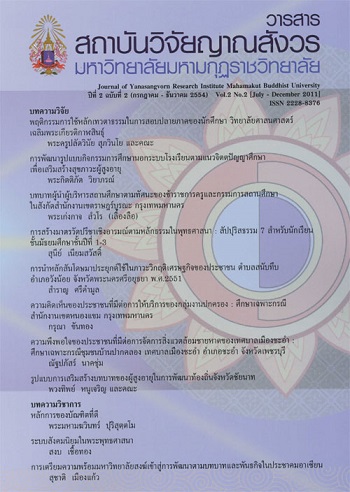Construction of a test to Measure Emotional Quotient in Accordance with the Buddhist principles 0f 7 Sappurisadhamma for students Matthayom Sueksa 1 - 3
Main Article Content
Abstract
The purpose of this research is concerned with the construction of a test measuring emotional quotient with the Buddhist principles of 7 Sappurisadhamma for Matthayom Sueksa 1 -3. Also developed is a norm for interpreting the results of this test in the form of a normal T- score. The sample population was comprised of 968 Matthayom Sueksa 1 – 3 in school under the supervision of the office of the Basic Education commission of the Bangkok Metropolitan Administration. The sample population was gathered by Multiple random sampling. The research tool consisted of the test, using the Delphi technique comprising eighty-four questions. The findings are as follows : The test to measure emotional quotient had an accuracy of content with an agreement value ranging from 0.50 to 1.00. The discriminatory power for each item found by the t-test . The t- ratio was between 2.02 to 8.19. The reliability level of the test using the alpha coefficient had a reliability level for the whole test at the level of 0.92. The whole model had a normal T- score ranging from T18 to T82.
Article Details
References
ชนิตา รักษ์พลเมือง. (2530 : 90). การวิจัยแบบเทคนิคเดลฟาย. วารสารการศึกษาแห่งชาติ
ชวาล แพรัตนกุล. (2517 : 101).การทดสอบเพื่อค้นและพัฒนาสมรรถภาพ. กรุงเทพ ฯ : มหาวิทยาลัยศรีนครินทรวิโรฒ ประสานมิตร. สำนักทดสอบทางการศึกษาและจิตวิทยา.
ผจงจิต อินทสุวรรณ,วิลาสลักษณ์ ชัววัลลี อัจฉรา สุขารมณ์และ อรพินทร์ ชูชม. (2545). การสร้างและพัฒนามาตรวัดปรีชาเชิงอารมณ์ตามแนวพุทธศาสนา สำหรับวัยรุ่นไทย. กรุงเทพ ฯ : มหาวิทยาลัยศรีนครินทรวิโรฒ ประสานมิตร. สถาบันวิจัยพฤติกรรมศาสตร์.
พระธรรมปิฎก. (ปอ. ปยุตฺโต) (2543 ก : 39-41). เจตโกศลหรือปรีชาเชิงอารมณ์. ในอัจฉรา สุขารมณ์ วิลาสลักษณ์ ชัววัลลี และ อรพินทร์ ชูชม (บรรณาธิการ).รวมบทความทางวิชาการ เรื่องอีคิว. (พิมพ์ครั้งที่ 2 :-35-42). กรุงเทพ ฯ: DESTOP.
ล้วน สายยศ และอังคณา สายยศ. (2543 :304). การวัดด้านจิตพิสัย. กรุงเทพฯ. สุวีริยาสาสน์. วิลาสลักษณ์ ชัววัลลี. กระแสอีคิว กระแสธรรม. ในอัจฉรา สุขารมณ์, วิลาสลักษณ์ ชัววัลลี และอรพินทร์ ชูชม (บรรณาธิการ) กรุงเทพ ฯ: DESTOP.
สมพร หลิมเจริญ(2537). การสร้างแบบทดสอบวัดจริยธรรมด้านมีวินัยในตนเอง สำหรับนักเรียนชั้นมัธยมศึกษาชั้นปีที่1. ปริญญานิพนธ์การศึกษามหาบัณฑิต.มหาวิทยาลัยนเรศวร.
สำนักงานคณะกรรมการการศึกษาแห่งชาติ. แผนการศึกษาแห่งชาติ (พ.ศ.2545-2549)พิมพ์ครั้งที่ 2 กรุงเทพมหานคร: พริกหวานกราฟฟิค.
สุภาพร พิสิฏฐ์พัฒนะ (2543). การสร้างแบบทดสอบวัดเชาว์ปัญญาทางอารมณ์ สำหรับนักเรียนชั้นมัธยมศึกษาชั้นปีที่3. ปริญญานิพนธ์การศึกษามหาบัณฑิต.มหาวิทยาลัยศรีนครินทรวิโรฒ.
สุวรรณา เชื้อรัตนพงษ์ (2527:68-77). การวิจัยด้วยเทคนิคเดลฟาย.วารสารการศึกษาแห่งชาติ.


